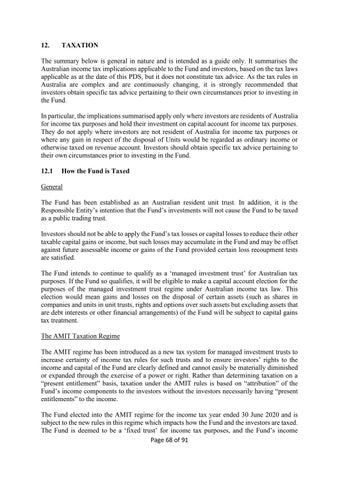12.
TAXATION
The summary below is general in nature and is intended as a guide only. It summarises the Australian income tax implications applicable to the Fund and investors, based on the tax laws applicable as at the date of this PDS, but it does not constitute tax advice. As the tax rules in Australia are complex and are continuously changing, it is strongly recommended that investors obtain specific tax advice pertaining to their own circumstances prior to investing in the Fund. In particular, the implications summarised apply only where investors are residents of Australia for income tax purposes and hold their investment on capital account for income tax purposes. They do not apply where investors are not resident of Australia for income tax purposes or where any gain in respect of the disposal of Units would be regarded as ordinary income or otherwise taxed on revenue account. Investors should obtain specific tax advice pertaining to their own circumstances prior to investing in the Fund. 12.1
How the Fund is Taxed
General The Fund has been established as an Australian resident unit trust. In addition, it is the Responsible Entity’s intention that the Fund’s investments will not cause the Fund to be taxed as a public trading trust. Investors should not be able to apply the Fund’s tax losses or capital losses to reduce their other taxable capital gains or income, but such losses may accumulate in the Fund and may be offset against future assessable income or gains of the Fund provided certain loss recoupment tests are satisfied. The Fund intends to continue to qualify as a ‘managed investment trust’ for Australian tax purposes. If the Fund so qualifies, it will be eligible to make a capital account election for the purposes of the managed investment trust regime under Australian income tax law. This election would mean gains and losses on the disposal of certain assets (such as shares in companies and units in unit trusts, rights and options over such assets but excluding assets that are debt interests or other financial arrangements) of the Fund will be subject to capital gains tax treatment. The AMIT Taxation Regime The AMIT regime has been introduced as a new tax system for managed investment trusts to increase certainty of income tax rules for such trusts and to ensure investors’ rights to the income and capital of the Fund are clearly defined and cannot easily be materially diminished or expanded through the exercise of a power or right. Rather than determining taxation on a “present entitlement” basis, taxation under the AMIT rules is based on “attribution” of the Fund’s income components to the investors without the investors necessarily having “present entitlements” to the income. The Fund elected into the AMIT regime for the income tax year ended 30 June 2020 and is subject to the new rules in this regime which impacts how the Fund and the investors are taxed. The Fund is deemed to be a ‘fixed trust’ for income tax purposes, and the Fund’s income Page 68 of 91


